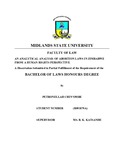Please use this identifier to cite or link to this item:
https://cris.library.msu.ac.zw//handle/11408/494Full metadata record
| DC Field | Value | Language |
|---|---|---|
| dc.contributor.author | Chin'ombe, Petronellah | - |
| dc.date.accessioned | 2014-11-03T08:50:09Z | - |
| dc.date.available | 2014-11-03T08:50:09Z | - |
| dc.date.issued | 2014 | - |
| dc.identifier.uri | http://hdl.handle.net/11408/494 | - |
| dc.description.abstract | Abortion is an “unlawful and intentional killing and causing the expulsion from the uterus of a human foetus”. At the heart of the abortion debate exists’ those who affiliate with the pro-life debate which is based mainly on the status of the embryo. The pro-life debate maintains that life and personhood begin at conception hence the right to life applies at conception and no other considerations can nullify this right. It accords the foetus with the status of a person with rights and interests worthy of legal protection. Against this argument are those that maintain that the embryo is never a person and that a woman has a right to abortion at any point of the pregnancy. They state inter alia that forcing a woman to carry a foetus to term is an invasion of her bodily integrity, moral autonomy and her moral rights to be treated as a human being. Thus, abortion becomes a human rights issue because of the right of autonomy in decision making in private matters which entitles a woman to decide whether to carry the foetus to term without any interference from the government | en_US |
| dc.language.iso | en | en_US |
| dc.publisher | Midlands State University | en_US |
| dc.subject | Abortion | en_US |
| dc.title | An analytical analysis of abortion laws in Zimbabwe from a human rights perspective | en_US |
| item.languageiso639-1 | en | - |
| item.grantfulltext | open | - |
| item.fulltext | With Fulltext | - |
| Appears in Collections: | Bachelor of Law Honours Degree | |
Files in This Item:
| File | Description | Size | Format | |
|---|---|---|---|---|
| PETRONELLAH CHIN'OMBE DISSERTATION.pdf | 322.65 kB | Adobe PDF |  View/Open |
Page view(s)
262
checked on Feb 15, 2026
Download(s)
250
checked on Feb 15, 2026
Google ScholarTM
Check
Items in MSUIR are protected by copyright, with all rights reserved, unless otherwise indicated.



